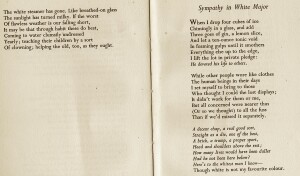 Larkin’s ‘Sympathy in White Major ‘ ( High Windows 1974) is one of his best known poems. It begins with a lip-smacking description of a gin and tonic being poured and ends with the poet drinking the health of ‘Here’s to the whitest man I know, though white is not my favourite colour.’
Larkin’s ‘Sympathy in White Major ‘ ( High Windows 1974) is one of his best known poems. It begins with a lip-smacking description of a gin and tonic being poured and ends with the poet drinking the health of ‘Here’s to the whitest man I know, though white is not my favourite colour.’
The poem is essentially about the doubtful virtues of unselfishness. Larkin lists all the virtues of his ‘white ‘altruistic protagonist: he ‘devoted his life to others ‘, ‘and was ‘a real good sort ‘, implying that these are qualities that are generally admired. However, as Larkin suggests in another poem, ‘Self’s the man ‘, someone who marries and has children is making a selfish choice rather devoting ‘himself to others’. Larkin looks at his own life as a non-white bachelor who has rejected this ‘ family man ‘ lifestyle, and contends that by being a poet and a novelist he has contributed more to society in general than has the ‘ white ‘ family man with responsibilities to others.
But placing its possible interpretation aside, where did Larkin get the phrase ‘the whitest man I knew‘? We know that he was an enthusiast for ‘ trad’ jazz. He owned a large collection of mainly traditional jazz records and some of his writings on jazz were collected in All What Jazz. But was he also knowledgeable in the field of Music Hall recitations and the music that often accompanied them? Was he familiar with the poem ‘The Whitest Man I Know’, which was written in 1913 in the era of Dixieland by the English actor and poet J.Milton Hayes, who also performed it to the music of R. Fenton Gower. Continue reading
